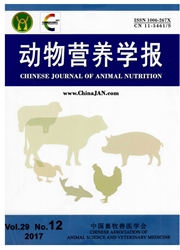

 中文摘要:
中文摘要:
本试验旨在研究燕麦干草为饲粮限饲对藏羊瘤胃发酵参数的影响,并估测其氮维持需要量。选用5只体况和体重[(45±2) kg]相近的20月龄去势公羊,进行饲养试验和绝食代谢试验。饲养试验采用4×4拉丁方设计,将5只羊随机分成4组(其中1组为2只藏羊,设为组内重复),设4个限饲水平,分别饲喂燕麦干草饲粮自由采食量的90%、70%、50%和30%,采集粪尿样,并在饲喂的0、2、4、6和8h采集瘤胃液,测定营养物质消化代谢指标及瘤胃发酵参数。绝食代谢试验测定其每天排出的粪氮、尿氮。结果表明:1)限饲水平对瘤胃液pH和乙酸、丙酸、异丁酸、戊酸和异戊酸含量及乙酸/丙酸无显著影响(P>0.050),而对丁酸含量和总挥发性脂肪酸浓度存在显著或极显著影响( P<0.050或P<0.001)。2)限饲水平对干物质、有机物、粗蛋白质、中性洗涤纤维和酸性洗涤纤维的消化率均无显著影响(P>0.050)。3)随绝食时间的延长,粪氮呈现出先降低后稳定的趋势,尿氮与总氮排出量均呈先降后升最后达到稳定的趋势。综合得出,限饲水平不影响藏羊对营养物质的消化,藏羊常规饲养期可消化氮维持需要量为0.12 g/(kg BW0.75· d),绝食期氮维持需要量为0.15 g/(kg BW0.75· d)。
 英文摘要:
英文摘要:
The objective of this study was to evaluate the effects of dietary restriction of oat hay on ruminal fer-mentation parameters of Tibetan sheep, and to estimate maintenance requirement of nitrogen.Five 20-month-old castrated male Tibetan sheep with similar body weight [ ( 45 ±2 ) kg] were selected in a feeding trial and a fasting metabolism trial.Five sheep were randomly divided into four groups ( two sheep in one of the groups as replicate) in the feeding trial using a 4 ×4 Latin square design.Four dietary restriction levels were set, which were 90%, 70%, 50 and 30%of voluntary intake, respectively.Feces, urine and rumen fluid (after 0, 2,4, 6 and 8 hours of feeding) were collected to measure the indices of digestion and metabolism of nutrients and rumen fermentation metabolic parameters.Feces and urine were collected to measure daily output of fecal and urinary nitrogen in the fasting metabolism trial.The results showed as follows:1 ) dietary restriction level had no significant effects on rumen fluid pH, the contents of acetate, propionate, isobutyrate, valerate and isovalerate, and acetate/propionate (P〉0.050), but had significant effects on butyrate content and total vola-tile fatty acid concentration ( P〈0 .050 or P〈0 .001 ) .2 ) Dietary restriction level had no significant effects on the digestibility of dry matter ( DM) , organic matter ( OM) , crude protein ( CP) , neutral detergent fiber (NDF) and acid detergent fiber (ADF) (P〉0.050).3) With the increase of fasting time, fecal nitrogen showed a tendency of being firstly decreased and then balanced, and urinary nitrogen and total nitrogen output both showed a tendency of being firstly decreased and then balanced.In conclusion, dietary restoration level does not affect nutrient digestibility of Tibetan sheep.Nitrogen maintenance requirement during regular feeding period is 0.12 g/(kg BW0.75· d), and that during fasting period is 0.15 g/(kg BW0.75· d).
 同期刊论文项目
同期刊论文项目
 同项目期刊论文
同项目期刊论文
 Urea kinetics and nitrogen balance and requirements for maintenance in Tibetan sheep when fed oat ha
Urea kinetics and nitrogen balance and requirements for maintenance in Tibetan sheep when fed oat ha Apparent digestibility, rumen fermentation and nitrogen balance in Tibetan and Fine-wool sheep offer
Apparent digestibility, rumen fermentation and nitrogen balance in Tibetan and Fine-wool sheep offer Influences of dietary nitrogen and non-fiber carbohydrate levels on apparent digestibility, rumen fe
Influences of dietary nitrogen and non-fiber carbohydrate levels on apparent digestibility, rumen fe Changes of chemical composition to high altitude results in Kobresia littledalei growing in alpine m
Changes of chemical composition to high altitude results in Kobresia littledalei growing in alpine m Importance of functional ingredients in yak milk derived food from alpine region on health of Tibeta
Importance of functional ingredients in yak milk derived food from alpine region on health of Tibeta Seasonal variations in the fatty acid profile of milk from yaks grazing on the Qinghai-Tibetan plate
Seasonal variations in the fatty acid profile of milk from yaks grazing on the Qinghai-Tibetan plate Comparison of methanogen diversity of yak (Bos grunniens) and cattle (Bos taurus) from the Qinghai-T
Comparison of methanogen diversity of yak (Bos grunniens) and cattle (Bos taurus) from the Qinghai-T 期刊信息
期刊信息
